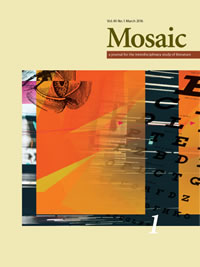Issue 49.1
Overview

General Issue
Published: March 2016
View the issue introduction or see the issue summary and contents below.
10 essays, totalling 192 pages
$21.95 CAD
This issue broaches the conflation of “animal” and “woman” in traditional discourses on sexuality and sexual difference in several unexpected, instructive, and interdisciplinary ways: approaching Woolf’s Flush as a source text for feminist and animal studies; reading the Victorian novel as blurring the genres of pornography and animal-autobiography; and engaging Derrida’s work on “the animal” together with works of fiction. Philosophical dualism is contested in these pages, in one instance through the theorizing of contagion. And, as only one more example of many, the issue raises a question with which all interdisciplinary research must content: how do writers and readers construct interpretive and (inter)disciplinary frames?
Referencing Proust in Annie Guéhenno’s L’ÉpreuveKathy Comfort This essay reads Annie Guéhenno’s L’Épreuve as a literary memoir. Guéhenno structures her memoir about her experiences in the French Resistance on key episodes from Marcel Proust’s À la recherche du temps perdu. In this way, we are afforded access into Guéhenno’s inner world as a young agent de liaison. | |
From Experiment to Epidemic: Embodiment in the Decadent Modernism of Arthur Machen’s ‘The Great God Pan’ and ‘The Inmost Light’Gabriel Lovatt In Arthur Machen’s Decadent horrors “The Great God Pan” and “The Inmost Light,” contagion becomes a modern form of transformation that upends Cartesian dualism. Drawing on theories of embodied cognition, late-nineteenth-century neuroscience, and Decadent aesthetics, this essay examines Machen’s depictions of the mind-body in tumult. | |
Vectors of a Flea: The Convergence of Species in Victorian Animal AutobiographiesJustin Prystash This essay examines three late-nineteenth-century novels—The Autobiography of a Flea, Black Beauty, and Beautiful Joe—that muddle the pornography and animal autobiography genres, revealing how representations of inter-species violence and sexuality were used to narrativize evolution and dissolve the ontological divide between human and animal. | |
Limbo, Pluto, Soprano: Negative Capability in Three UnderworldsWayne Glausser Keats defines his paradoxical virtue of “Negative Capability” as a willingness to remain in doubt. Three recent interpretive controversies offer test cases: debates about Limbo, Pluto, and the finale of The Sopranos. In all three cases, traditional authority engages with some version of vox populi that both threatens and enriches the production of knowledge. | |
Redrawing History: Visual Postmemory in Tardi’s 120, rue de la GareJennifer Anderson Bliss This essay explores ways in which Tardi’s adaptation marks the otherwise apolitical narrative with historical indicators. Through the comics medium and the prolific use of shifting signifiers and monikers, the text grapples with the uneasy notion of a national identity threatened by Nazi occupation and the legacy of WWII. | |
The Detective as ‘Zombie of the Interrogative Mood’ in Cameron McCabe’s The Face on the Cutting-Room FloorRomén Reyes-Peschl While Cameron McCabe’s detective novel The Face on the Cutting-Room Floor interrogates its own generic mystery elements, Padgett Powell’s The Interrogative Mood asks if its own constant questions are “independent [. . .] zombies of the interrogative mood.” This essay examines how reading as mutual interrogation brings text, detective and reader in McCabe’s novel (back) to life. | |
‘Set my lands in order’: States of Exception, the Cinematic, and The Waste LandSean Dempsey After describing how states of exception are understood differently by T.S. Eliot and his German contemporary Carl Schmitt, this essay draws upon recent discussions concerning cinema and literature to trace how The Waste Land, by disrupting networks that normally capture and coordinate conviction, helps us see that the way we frame things matters. | |
Gift-Giving and Domesticating the Upper-Class Pooch in FlushPayal Taneja Engaging in Virginia Woolf’s Flush as an important text for feminist, modernist, and animal studies, this essay argues that the female figures in this text resist commodifying their pet by acting as guardians. But this critique of commodification is undercut by the anthropomorphizing practices of pet-keeping and the class politics portrayed in the novel. | |
Time and Timelessness: A Study of Narrative Structure in Murakami Haruki’s Kafka on the ShoreVirginia Yeung This essay examines narrative structure and themes in Murakami Haruki’s Kafka on the Shore, mainly from the standpoint of time. It argues that many of the novel’s central ideas, such as growth, recovery from trauma, and the redemptive value of suffering, are explored through the philosophical concept of time. | |
Jazzing the Novel: The Derridean Ethics of Michael Ondaatje’s Coming through SlaughterNatalie Diebschlag This essay focuses on the depiction of jazz in Michael Ondaatje’s Coming through Slaughter. I argue that the elusiveness of Buddy Bolden’s music and Ondaatje’s own experimentalism enact the ethics that is central to the work of Jacques Derrida. By extension, they articulate a diasporic condition that is both universal as well as culturally specific. |